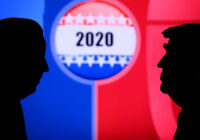Almost every commentator in the media commended Democratic presidential nominee Joe Biden on his acceptance speech at the Democratic National Convention.
At the core of his speech, Biden offered this thought, as if he was composing a humorless Devil’s Dictionary: “I have always believed you can define America in one word: Possibilities. That in America, everyone, and I mean everyone, should be given the opportunity to go as far as their dreams and God-given ability will take them.”
Here is today’s 3D definition:
Possibilities:
1) In a non-deterministic world, the element of chance that keeps hopes alive even when all the evidence points to a fundamentally hopeless situation
2) The opposite of probabilities, meaning there is a low likelihood of success
Contextual Note
The New York Times accurately describes the feeling the Democrats had at the end of their week of a virtual convention as a sense of relief more than accomplishment: “Democrats breathed a collective sigh of relief this week after the party pulled off an all-virtual convention, half political music video and half Joe Biden infomercial, largely without a hitch.” Neither hitch nor major glitch. This sums up the performance of the Democratic Party’s team of practicing high jumpers. They have honed their ability to sail over low bars.
US Oligarchs Are Literally Bubbling With Emotion
The media identified the real reason for deeming Biden’s acceptance speech successful: low expectations. This may be emblematic not only of this entire election cycle, but also of how Americans have come to conceive of their democracy itself. The phenomenon was already visible in the 2016 presidential contest. The two dominant parties appear to have settled on a strategy designed principally to allow them to propose candidates with little appeal, possibly because neither party really wants to govern. In 2016, the parties opposed the two least popular candidates in history. And 2020 doesn’t look that different.
The Hill reports, with a tone of mild surprise, the assessment of Fox News host Chris Wallace, who “said that the former vice president’s speech ‘blew a hole’ in President [Donald] Trump’s characterization of him as mentally unsound for the presidency.” Astead W. Herndon and Annie Karni, the authors of The Times article, interpret this as the result of a strategic error on the part of Trump. “The Joe Biden many Americans saw this week,” they wrote, “was cleareyed and capable of commanding an audience, albeit reading from a teleprompter in a room that was largely empty.”
On the other hand, they have no illusions about what this means. “If that is a low bar, it is because Mr. Trump and some of his most prominent allies have helped to lower it,” the authors add. It sounds something like Muhammad Ali’s famous “rope-a-dope” strategy to win back the heavyweight championship.
When Biden insisted that America could be defined by a single word, “possibilities,” he set the bar as low as it might go. Throughout most of the 20th century, the phenomenon he is referring to as “possibilities” was called the “American dream.” It was the idea that anyone could become rich and anyone could become president. It was just a question of self-motivation. If you didn’t attain it, it was because you didn’t want it enough.
Even before the coronavirus pandemic, most Americans had lost confidence in the American dream. Biden either hasn’t kept up with the trend or sees nostalgia as a last-ditch marketing tool. With tens of millions of newly-unemployed Americans wondering whether they may not need to become an Uber driver just to ensure their short-term future, the American dream has achieved the status of an opiate-induced hallucination.
In its heyday, the American dream posited that the improbable is always possible. But now, given the failure of all systems — starting with government — to guarantee any form of economic and social stability, it requires accepting the idea that what everyone now is resigned to seeing as utterly impossible may somehow still be possible. The strain may be too great to justify holding that belief.
But Biden may not be wrong. After all, Trump is a real president and Biden is still a possible president. If, in the midst of all the current crises, the real is now perceived as the source and explanation of the impossibility of survival, the remote hope that a change could happen has unquestionable appeal. That may be true even if Biden — unlike Trump in 2016 — represents not something new and different, but all that is only too familiar as a pillar of the traditional political establishment.
In the runup to the 2016 election, Barack Obama, understanding that voters preferred his image to that of Hillary Clinton, invented the trope of his values being “on the ballot.” He famously intoned, “I am not on the ballot, but I tell you what. Fairness is on the ballot. Decency is on the ballot. Justice is on the ballot. Progress is on the ballot. Our democracy is on the ballot.”
Recycling the trope, undoubtedly with Obama’s blessing, Biden offered a new variant: “Character is on the ballot. Compassion is on the ballot. Decency, science, democracy. They are all on the ballot. Who we are as a nation. What we stand for. And, most importantly, who we want to be. That’s all on the ballot.”
In other words, he is saying: You all remember Obama. Let’s take two steps back and try to relive that experience characterized by the promise of hope and change. But the Democrats should be asking themselves this question: Are US voters motivated enough by Biden’s campaign to take two steps back? More fundamentally, is retreating into the past really what they want?
Historical Note
During the Democratic primary campaign, especially during the debates, Joe Biden repeated the same message over and over again. His latest formulation, in his acceptance speech, took the form of this truism every young American is taught at school: “[T]here’s never been anything we’ve been unable to accomplish when we’ve done it together.”
Some may question the historical verity of such a statement. Since 1945, for example, the US has tried to win multiple wars (most of which it started) and, although doing it not only “together” but also equipped with the most sophisticated expensive technology, the nation has consistently proved literally unable to accomplish that feat. It is nevertheless true that sending men to the moon (but no women) was an example of accomplishing something extraordinary and doing it together. But the next time it happens, it will more likely be a private venture than a collective effort.
The moon landings may have been the last authentic symbol of the shared American dream. One of the reasons people no longer evoke the American dream stems from their realization that it does exist, but only applies for a tiny group of people. And even their cases are fraught with ambiguity. What America accomplished when Neil Armstrong took “one giant leap for mankind” was a collective triumph. The next time it is more likely not to be in the name of the United States or mankind but of Elon Musk.
Yes, Warren Buffett, Bill Gates, Steve Jobs and Musk — but also the more diverse examples of Kanye West, Michael Jordan and any number of Hollywood celebrities — have demonstrated the possibility of mobilizing their talent and other people’s money or fandom to realize the American dream.
But many of the most recent achievements turn out to be flawed. Donald Trump himself is a prime example. He represents more a parody of the American dream than a realization of it. And he still has possibly 35% to 40% of Americans who continue to accept him as a role model. But there are too many Bernie Madoffs, Jeffrey Epsteins and Harvey Weinsteins alongside Trump and other fabulously successful but fundamentally unscrupulous characters not to call into question the morality of the quest for riches.
By definition, the future is always a world of “possibilities.” But so is a poker game. Poker is — historically and symbolically — one way of realizing the American dream. But for each big winner, there are thousands if not millions of losers.
*[In the age of Oscar Wilde and Mark Twain, another American wit, the journalist Ambrose Bierce, produced a series of satirical definitions of commonly used terms, throwing light on their hidden meanings in real discourse. Bierce eventually collected and published them as a book, The Devil’s Dictionary, in 1911. We have shamelessly appropriated his title in the interest of continuing his wholesome pedagogical effort to enlighten generations of readers of the news. Read more of The Daily Devil’s Dictionary on Fair Observer.]
The views expressed in this article are the author’s own and do not necessarily reflect Fair Observer’s editorial policy.
Support Fair Observer
We rely on your support for our independence, diversity and quality.
For more than 10 years, Fair Observer has been free, fair and independent. No billionaire owns us, no advertisers control us. We are a reader-supported nonprofit. Unlike many other publications, we keep our content free for readers regardless of where they live or whether they can afford to pay. We have no paywalls and no ads.
In the post-truth era of fake news, echo chambers and filter bubbles, we publish a plurality of perspectives from around the world. Anyone can publish with us, but everyone goes through a rigorous editorial process. So, you get fact-checked, well-reasoned content instead of noise.
We publish 3,000+ voices from 90+ countries. We also conduct education and training programs
on subjects ranging from digital media and journalism to writing and critical thinking. This
doesn’t come cheap. Servers, editors, trainers and web developers cost
money.
Please consider supporting us on a regular basis as a recurring donor or a
sustaining member.
Will you support FO’s journalism?
We rely on your support for our independence, diversity and quality.








Commenting Guidelines
Please read our commenting guidelines before commenting.
1. Be Respectful: Please be polite to the author. Avoid hostility. The whole point of Fair Observer is openness to different perspectives from perspectives from around the world.
2. Comment Thoughtfully: Please be relevant and constructive. We do not allow personal attacks, disinformation or trolling. We will remove hate speech or incitement.
3. Contribute Usefully: Add something of value — a point of view, an argument, a personal experience or a relevant link if you are citing statistics and key facts.
Please agree to the guidelines before proceeding.